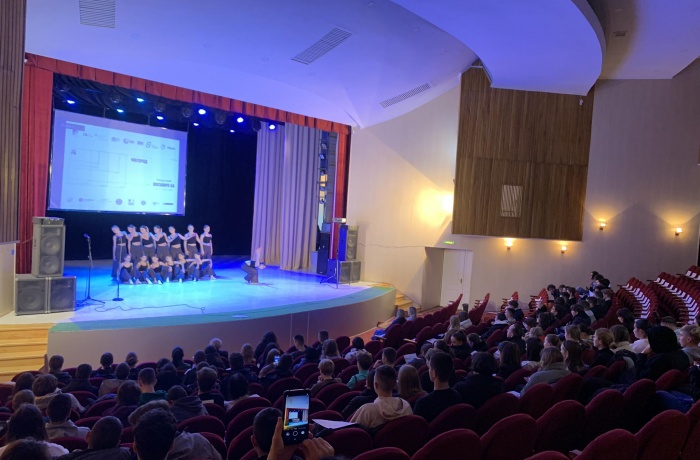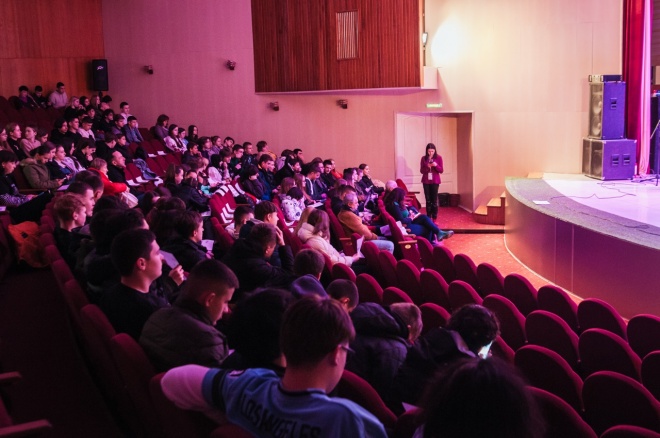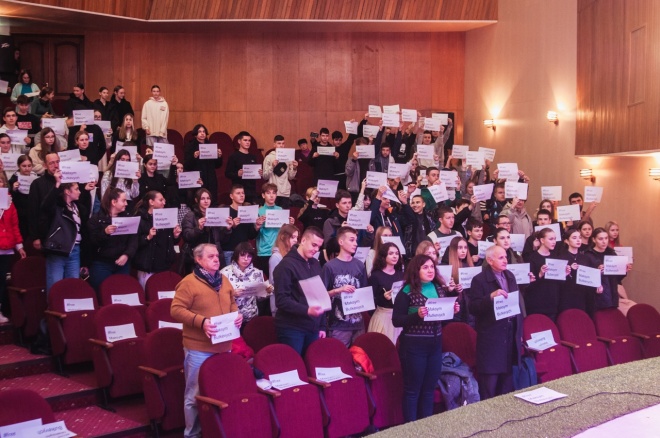On the Necessity of Culture, Seeking Hope, and the Resilience to Persevere: King Lear at Travelling Docudays UA in Uzhhorod
On the Necessity of Culture, Seeking Hope, and the Resilience to Persevere: King Lear at Travelling Docudays UA in Uzhhorod

On November 21, Uzhhorod hosted the opening of the 20th edition of Travelling Docudays UA. The venue was the Transcarpathian Regional Center for Children and Youth Creativity PADIIUN, a location featured in one of this year’s festival highlights, King Lear: How We Looked for Love During the War, directed by Dmytro Hreshko.
The opening ceremony and film discussion welcomed the author of the idea and theatre director Viacheslav Yehorov, the film’s protagonist and director, Honoured Artist of Ukraine Oleksandr Kutsyk, alongside protagonists Yulia Horelkova and Olena Aliabieva.
The opening of the Travelling Docudays UA in Uzhhorod commenced with a performance by two creative teams: the Energy-Mime pantomime studio and the contemporary dance ensemble Blitz. Festival coordinators Maria Mendzhul and Maria Symkovych extended a warm welcome to the audience, highlighting the event line up, this year’s theme Image of the Future, and the need to shape a new Ukrainian dream through engaging dialogue with the spectators.

The Travelling Docudays UA in Uzhhorod. Photos: Vitalii Diachuk and Yaroslav Diulenko
According to the event organisers, the discussion revolved around envisioning the future and initiating the Ukrainian dream today. It also delved into the imperative dialogue about justice, focusing on the inevitable accountability for war crimes, documenting the testimonials of victims, and the resulting destruction. Furthermore, the future reconstruction of Ukraine should adhere to the principles established in Lugano: equality and inclusivity of minorities, engaging communities in reforms, fostering collaboration among diverse stakeholders, emphasizing transparency, combating corruption, nurturing international partnerships, and sustainable development.
Halyna Penderetska, Deputy Director of PADIIUN, extended her greetings, highlighting that the choice of PADIIUN as the venue for Travelling Docudays UA is not arbitrary. This centre has become a new home for those who sought refuge from the war in various cities and towns across Ukraine. These individuals have become the protagonists of Dmytro Hreshko’s film King Lear: How We Looked for Love During the War, which was shot at the centre.
Anzhela Babkina, a civic activist and regional coordinator of the Uzhhorod Office of the Ukrainian Helsinki Human Rights Union, spoke about the significance of documenting war crimes, the establishment of a relevant database, and the opportunity to reach out to the UHHRU Office in Uzhhorod. Diana Kaints, Vice President of the NGO Zonta Club of Uzhhorod, also delivered a welcoming speech.
The screening of King Lear: How We Looked for Love During the War, directed by Dmytro Hreshko, marked the opening of the event, aligning with the Day of Dignity and Freedom. In addition to internally displaced persons finding refuge at the Transcarpathian Regional Center for Children and Youth Creativity PADIIUN, the film features volunteers and staff members of the Center as its protagonists.

The audience of the Travelling Docudays UA in Uzhhorod during the #FreeMaksymButkevych action. Photos: Vitalii Diachuk and Yaroslav Diulenko
The film tells the story of the IDPs who ended up in Uzhhorod and took part in the production of a Shakespearean tragedy under the guidance of a local director Viacheslav Yehorov. The director observes the transformations of the individuals who, amidst the tragic backdrop of war, discover new aspects of themselves. The director of the play also undergoes a personal discovery – amid the chaos of war, he finds an unexpected opportunity to fulfil his long-held dream of staging this particular Shakespearean work.
The film’s director Dmytro Hreshko recorded a video message for the audience, where he thanked the organisers and the audience for participating in the screening. He reflected on the question he asked himself before starting the shooting: Does culture have a place during the great war in Ukraine? His film serves as a means to explore and share the answer to this question. The recorded stories of individuals stand as direct testimony to the transformative power of culture and art, offering hope and strength to persevere in the face of adversity.
During the event, the organisers Maria Mendzhul and Maria Symkovych, along with the audience, participated in an all-Ukrainian flash mob advocating for the release of Maksym Butkevych. Maksym, a Ukrainian human rights activist, journalist, screening moderator, and Docudays UA ceremony host, went to the front to defend Ukraine at the beginning of the full-scale invasion. Unfortunately, he was captured on the battlefield and later unlawfully sentenced to imprisonment by a Russian court. This fall, the family learned that Maksym had been transferred from the Luhansk detention centre to an unknown location, and his current whereabouts remain unknown.
Main photo: Vitalii Diachuk and Yaroslav Diulenko.
The 20th Travelling Docudays UA is supported by the Embassy of Sweden in Ukraine, the Embassy of Switzerland in Ukraine, and the US Embassy in Ukraine. The opinions, conclusions, or recommendations do not necessarily reflect the views of the governments, charities, or companies of these countries. The content of this publication is the sole responsibility of its authors.












